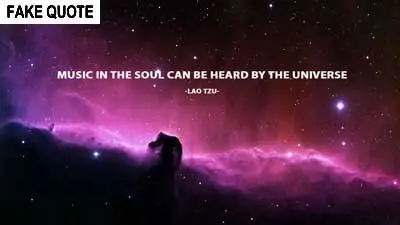|
Tao Te Ching
THE TAOISM OF LAO TZU
|
Fake Lao Tzu Quote"Music in the soul..."
This is NOT a quote from Tao Te Ching:"Music in the soul can be heard by the universe."
This cryptic statement has a poetic flare that inspires contemplation but as a Lao Tzu quote, three of its words raise questions: music, soul, and universe. Neither of them fits his vocabulary that well. As for music, Lao Tzu seems not to have given it much thought. The word appears only once in Tao Te Ching, and that's in passing. It's in chapter 35 (my version):
In my version of the text, the word is mentioned only once, and I think I should really have used some other term if I could find one more accurate. It is at the start of chapter 10, where Lao Tzu lists abilities that a true sage should have:
Thirdly, the word universe implies an understanding of a vast space in which our planet is in no way the middle, nor the place where it all began. In the time of Lao Tzu, that would be a stretch of the imagination, indeed. He spoke about the world, meaning the earth we walk on and the heaven we see when we look up. And this world he spoke about a lot, certainly. But even with a wording more accurate to Lao Tzu's understanding, some kind of internal music heard by the world would make little sense to him or us. Is it a hint at telepathy of some sort? Or should it be interpreted as symbol for inner joy, concluding that happiness is contagious? I think Lao Tzu would frown at the idea. Although obviously humorous, he was no entertainer. In his world, events were caused by people's actions, not their moods. The origin of this quote is a difficult one to trace. The first mention of it I found on Facebook is from July 21, 2009, accrediting it to Lao Tzu. Next year it appeared five times, two of which accredited it to Lao Tzu. Since then the quote, with the Lao Tzu reference, has spread modestly on Facebook, increasingly by meme images. Slightly earlier, on January 10, 2009, the quote got its first like on the Goodreads website, also accrediting it to Lao Tzu. By now (August 2020) it has received 666 likes, which is a number with its own symbolic significance. A Google search (August 2020) gives almost 70,000 hits with the exact wording of the quote. There are several printed books containing the exact quote, the oldest of which is Kung Fu Meditations & Chinese Proverbial Wisdom, by Ellen Kei Hua, first published in 1973 and revised 1974. A major part of the book consists of 41 quotes called "meditations," where the 37th is the quote discussed here. Unfortunately there is no source specified for any of the quotes, but the introduction states that Tao Te Ching, Chuang Tzu, I Ching, and "other Chinese and Eastern sages" have been used. Many of the quotes are indeed from Tao Te Ching but not this one. Nor is this quote from Chuang Tzu, but there is something similar in his Book 14, "The Revolution of Heaven," translated by James Legge in 1891 (page 349):
That is still quite far from the quote examined here. The expression "music in the soul" has a long history, though. An Internet Archive search brings close to 2,000 books from the year 1800 to the present containing the expression. The English poet Samuel Taylor Coleridge (1772-1834) wrote in the ode "Dejection" from Sibylline Leaves, 1817 (page 240):
A minimal variation, "music of the soul," brings twice as many results in an Internet Archive book search. To Voltaire, the French 18th century philosopher, that music ("la musique de l'βme") was poetry. He wrote in his Philosophical Dictionary (volume v, 2nd edition, 1824, page 252):
But I doubt that any of the philosophers thought that the planets listened to music within the human soul.
Stefan Stenudd September 18, 2020.
More Fake Lao Tzu QuotesThere are many more fake Lao Tzu quotes examined on this website. Click the header to see a list of them.
Fake interview with the authorClick the header to read a "fake" interview with Stefan Stenudd, the author of Fake Lao Tzu Quotes.
About CookiesMy Other Websites:I Ching OnlineThe 64 hexagrams of the Chinese classic I Ching and what they mean in divination. Try it online for free.
Qi Energy ExercisesThe ancient Chinese life energy qi (chi) explained, with simple instructions on how to exercise it.
Life EnergyThe many ancient and modern life force beliefs all over the world explained and compared.
Taoismen på svenska
Other Books by Stefan StenuddClick the image to see the book at Amazon (paid link).
The Greek philosophers and what they thought about cosmology, myth, and the gods. |
 Tao Te Ching
Tao Te Ching Now it's a book, too!
Now it's a book, too! Tao Quotes
Tao Quotes Cosmos of the Ancients
Cosmos of the Ancients Qi Increase Your Life Energy
Qi Increase Your Life Energy Aikido Principles
Aikido Principles Life Energy Encyclopedia
Life Energy Encyclopedia Archetypes of Mythology
Archetypes of Mythology Psychoanalysis of Mythology
Psychoanalysis of Mythology Stefan Stenudd
Stefan Stenudd